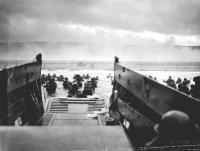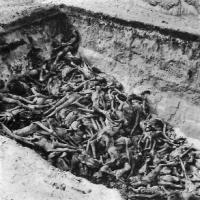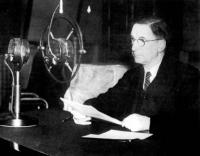Radio ear : The disowned army Face the Facts series
Published in 20th-century / Contemporary History, Issue 2(March/April 2012), Reviews, Volume 20, World War I
Normandy, 6 June 1944. Regardless of the controversy, it is important that the recollections of Irish deserters who subsequently joined the British Army be recorded by historians: these are men who have seen battle at historic moments like D-Day, with remarkable stories to tell.
There has been much comment in the media in recent months on the issue of Irish Army deserters who subsequently fought for the British Army in World War II. There have been calls for the state to pardon the thousands of men who deserted (even Sinn Féin supports the call for a pardon). Much of the journalism on the subject has been highly emotive, with the Sunday Times article, ‘Just deserters’, of 1 January particularly notable, quoting the daughter of one deserter as saying that ‘the drastic measures they faced here were nearly worse than the Gestapo’. Some reports in the British media have tended to present the Irish deserters as anti-fascists first and foremost, for example the BBC news report of 2 January—‘Irish government promises action on WWII deserters’—which noted that ‘Ireland was neutral during the conflict, but around 10% of its armed forces deserted to join the fight against fascism’.The general tone of this BBC feature, part of the Face the Facts series, was set not only by its title but also by reporter John Waite in his introduction, when he noted that the programme would focus on ‘Second World War heroes’ who ‘in their own country have been treated more like villains’. The documentary interviewed a variety of individuals, ranging from veteran deserters to Labour TD Gerald Nash. The oral testimonies of the men who saw combat were interesting—in spite of Waite’s leading questions. Yet there were some telling reminiscences—for example, when John Stout, a Corkonian who deserted for reasons of economics, tells Waite that when he arrived at the British Army depot in Belfast ‘I could smell the food up the road’, and that as a lad of seventeen years he was glad to get out of where he was. Regardless of the controversy, it is important that their recollections be recorded by historians: these are men who have seen battle at historic moments like D-Day, with remarkable stories to tell.

Brothers Paddy (second left) and Freddy Reid (third left), two of the thousands of Irish soldiers who deserted to join the British Army during World War II. (Paddy Reid)
At the heart of the documentary was Emergency Powers Order No. 362 (EPO 362), which Waite referred to on several occasions during the 27-minute production as the ‘starvation order’. Fine Gael’s Thomas O’Higgins had spoken of ‘seven years of starvation’ (referring to the bar on deserters getting public employment) in a Dáil debate in 1945. The term ‘starvation order’ crops up a year later in British cabinet papers. Waite refers to its sanctions as ‘punitive measures in the extreme’. Under EPO 362, Irish soldiers absent from their posts for more than 180 days were summarily dismissed from the Irish Army, losing all entitlements to gratuities, allowances and pensions from the date they absconded and were barred from public employment for seven years. (See ‘Dev’s treatment of Irish Army deserters: vindictive or pragmatic?’ in HI 19.5, Sept./Oct. 2011, pp 39–41.) The treatment of deserters elsewhere in the period was not examined.

The documentary used a news clip on the liberation of Bergen-Belsen concentration camp to emphasise that the battle against Hitler and fascism was the primary motivational factor for these men to desert.
Notable in the research of Yvonne McEwen, and referenced in Gerald Morgan and Gavin Hughes’s Southern Ireland and the liberation of France, is the fact that a study of the ages, occupations and demographics of the deserters suggests that, for many, economic necessity influenced the decision to desert to another army. Yet repeatedly Waite asserted confidently that ‘many Irishmen deserted their own shores to fight fascism, some to have adventure’, whereas it remains difficult to say for certain why they deserted.Neither did Waite provide any context to his British audience, in particular the threats facing the Irish state, both internally and externally. Not only was there a threat to the state from militant republicanism but there was also the threat of invasion from both belligerents. Waite didn’t consider the political situation in Ireland at the time—for example, incidents like the ‘Christmas raid’ of December 1939, when the IRA made off with a large amount of weaponry from the Phoenix Park’s magazine fort. There were very real threats to the Irish state both at home and from abroad: strong defence forces, backed up by sanctions against desertion, were a necessity. To be fair, contributor Gerald Morgan did provide some historical background. Rather oddly, the documentary appeared to suggest that the children of deserters were subjected to particularly nasty treatment in industrial schools and similar institutions following the war. While we must accept the veracity of such testimony, no evidence was presented that the children of deserters were targeted any more than others.

Eamon de Valera broadcasting his famous reply to Churchill in May 1945. There was little acknowledgement of the complexities of Irish neutrality at the time.
The documentary used archival recordings and news clips, e.g. a British news report on the liberation of Bergen-Belsen concentration camp, a harrowing piece in which the reporter speaks of ‘the smell of death and decay, of corruption and filth’ and of walking into ‘the world of a nightmare’. Fascism and its ills was something the documentary came back to time and time again, and the reasoning behind this is evident: the documentary wished to present the battle against Hitler as the primary motivational factor for these men to desert. There is undoubtedly a documentary to be produced around the fact that nearly 10% of the armed forces of the nation would desert it in a time of world conflict, yet this effort does not contribute greatly to our understanding of just why that occurred. Nor does it offer a fair and balanced study of the controversial emergency powers order of 1945 or acknowledge the complexities of Irish neutrality at the time. It was as emotive as much of the recent print journalism on the subject. HI
Donal Fallon is co-editor of ‘Come Here To Me’, a blog on Dublin life and culture, http://comeheretome.wordpress.com/.
















